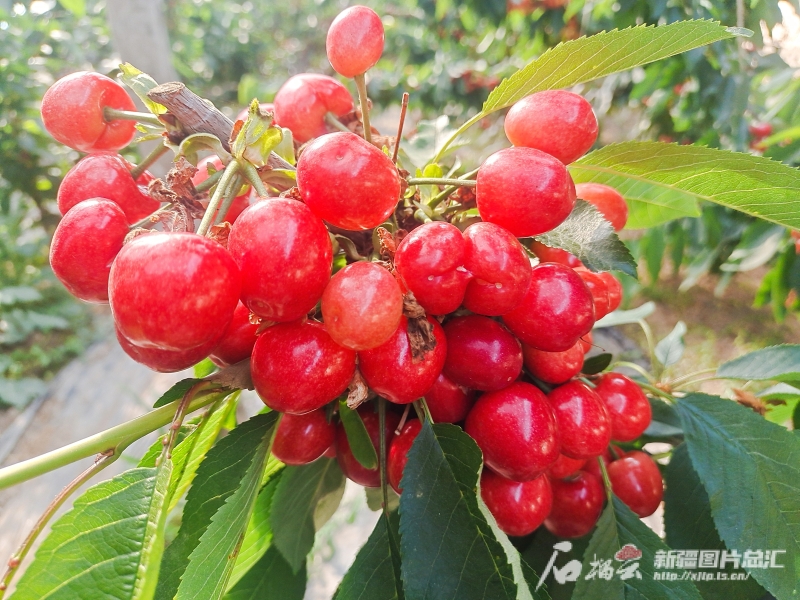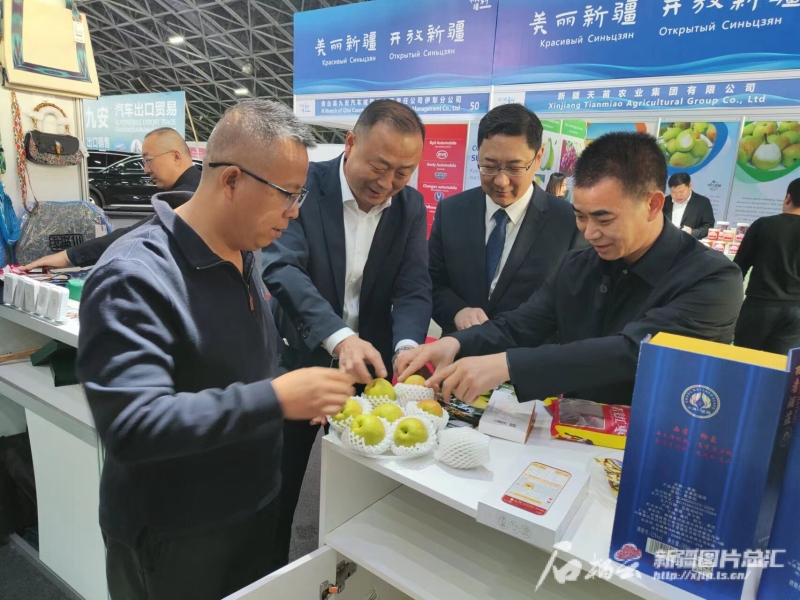Shiliuyun-Xinjiang Daily (Reporter Cao Hua) news: In May, Xinjiang's early-maturing fruits, such as apricots, watermelons, cherries, and peaches, are gradually available for sale in the market, exuding a sweet fragrance.

Photo shows cherries in a greenhouse of Liangfanchang in Qapqal Xibe Autonomous County, Ili Kazak Autonomous Prefecture, northwest China's Xinjiang Uygur Autonomous Region, have ripened. (Photo offered by the Media Convergence Center of Qapqal Xibe Autonomous County)
The fruit industry is a characteristic and advantageous sector in Xinjiang. In recent years, Xinjiang has focused on the high-quality development of the fruit industry, continuously improving the quality of fruits. More and more high-quality fruits are also going abroad and selling well overseas.
According to the General Administration of Customs of the People's Republic of China, Xinjiang's fruit exports have grown rapidly in the first quarter of this year. The cumulative export of fruits reached 46,000 tons, a year-on-year increase of 19.7 percent, with export revenue reaching 532 million yuan (about 73.5 million U.S. dollars).
Strong performance in fruit exports
On May 10, 2024, a cold chain transport truck loaded with 21 tons of apples departed from Xinjiang Jiuding Agricultural Products Wholesale Trading Market, Xinjiang's largest fruit and vegetable wholesale market, and reached Almaty, Kazakhstan, through the Horgos Port.
With the continuous deepening of the joint construction of the Belt and Road Initiative, the export scale of high-quality fruit products in Xinjiang is gradually expanding, with an increasing variety of products. Xinjiang's apple juice is exported to Russia, walnuts and red dates are sold to Europe through the China-Europe Railway Express, and Korla fragrant pears are exported to Southeast Asia, Europe, and America.
On April 21, 2024, Aksu Guoxiangyuan Agricultural Development Co., Ltd. shipped seven tons of Korla fragrant pears for export to Malaysia. "This year marks our company’s first-time export of fragrant pears. We have already exported 40 tons in February and will increase our efforts to develop international markets," said Li Jinrong, manager of the company.
Korla fragrant pears are among the first batch of fruit products exported from Xinjiang. As early as the 1970s, these pears had already been exported to countries in Southeast Asia, such as Singapore. After nearly half a century, Korla fragrant pears have become a representative product of Xinjiang fruit entering the international market, and are favored by foreign consumers. It is now sold in over 30 countries and regions, including Southeast Asia, Central Asia, and Europe.

Photo shows Korla fragrant pears in the 13th Uzbekistan-China Xinjiang Commodities Expo. (Photo offered by the Media Convergence Center of Korla City)
Horgos Jinyi International Trade (Group) Co., Ltd. is a leading company at the autonomous region level, primarily focusing on the export of fruits and vegetables. The company exports fruits, including apples, plums, peaches, grapes, and others, to various Central Asian countries all year round. "Xinjiang has vast territory with less industrial pollution, as well as rich solar resources and a great location with many ports, making it very suitable for developing a green organic fruit and vegetable industry," said the company's chairman, Yu Chengzhong.
According to Urumqi Customs, Xinjiang exported approximately 200,000 tons of various fruits in 2023, an increase of nearly 150 percent compared to 2022. The export value of fruits was about two billion yuan (about 0.28 billion U.S. dollars), representing an almost 80 percent increase from 2022.
Competitive strengths in export
Xinjiang is renowned as the "land of melons and fruits." In 2023, the fruit planting area in Xinjiang reached about 1,406,667 hectares, with a fruit output of 13.78 million tons.
Walnuts are one of the largest fruit tree species in Xinjiang, ranking second in both planting area and yield nationwide. Currently, 30 percent of Xinjiang's walnuts are sold aboard.
Xinjiang Kelaimu Agricultural Products Co., Ltd., located in Hetian County, is a company specializing in walnut exports. In 2023, the company exported 20,000 tons of original walnuts and 4,000 tons of walnut kernels, offering products for customers in 18 countries and regions.
"The export volume of Xinjiang walnuts expands every year. In the first quarter of this year, due to the strong demand for Xinjiang walnuts in the global market, the company faced a shortage of walnut supply," said Ruzimamat Nur, the company's general manager. Xinjiang walnuts are mainly exported to countries such as Pakistan, Russia, Kazakhstan, Türkiye, Japan, and Canada and are widely used in the confectionery, beverage, and snack industries.
Ruzimamat Nur believes that Xinjiang walnuts are highly competitive in global markets, not only due to their good quality but also their competitive prices. With the forestry industry quality improvement project implemented in Xinjiang in recent years, both the quality and yield of walnuts have significantly increased. Xinjiang walnuts are becoming increasingly popular in the international market. It is expected that in the coming years, the export proportion of Xinjiang walnuts will increase to 50 percent.
Xinjiang Kelamun Agricultural Products Co., Ltd. is planning to establish an overseas warehouse in Kazakhstan this year to tap into the global market.

Photo taken on April 16, 2024 shows Luo Zhiquan, a nectarine grower in Yarkant County, Kashi Prefecture, northwest China’s Xinjiang Uygur Autonomous Region, picks ripe nectarines. (Photo offered by the Media Convergence Center of Yarkant County)
Established in 2005, Tacheng Likai Trading Co., Ltd. has grown into a leading national enterprise in agricultural industrialization after nearly 20 years of development, exporting over 60,000 tons of various fruits annually with sales exceeding 800 million yuan (about 110.57 million U.S. dollars).
“Xinjiang has a strategic advantage in developing an export-oriented fruit industry, and fruits can be efficiently transported to neighboring countries through ports and convenient transportation such as highways and the China-Europe freight train,” said Yu Xinli, a representative of the company. As the Belt and Road Initiative progresses, trade exchanges between Xinjiang and neighboring countries are increasing, providing significant business opportunities for the export of Xinjiang’s fruits.
Going global
Going global has become a new goal for the high-quality development of Xinjiang's fruit industry.
About 467 hectares of seabuckthorn thrive at the Jinse Industry Planting Professional Cooperative Base in Qinghe County, Altay Prefecture, northwest China’s Xinjiang Uygur Autonomous Region. This seabuckthorn orchard has been registered at the customs, becoming the first registered export fruit orchard for seabuckthorn in Altay Prefecture. "Last year, we successfully exported 260,000 liters of seabuckthorn juice to Russia, with export earnings exceeding 20 million yuan (about 276,272 U.S. dollars)," said Wang Jin, legal representative of the company.
According to statistics from the Xinjiang Forestry and Fruit Industry Development Center, there are currently 205 registered export fruit orchards in Xinjiang, an increase of nearly 100 percent compared to 2022. Various regions in Xinjiang are continuously improving their production capacity for green, organic, and high-quality fruits.
With supportive policies issued by the government, the export capabilities of fruit companies in Xinjiang have been enhanced. At present, Xinjiang has over 300 fruit companies qualified for export, an increase of more than 30 percent compared to 2022.
Xinjiang actively organizes companies to participate in domestic and international exhibitions, helping them tap into the global market. At the 13th Uzbekistan-China Xinjiang Commodities Expo, Xinjiang fruit companies showcased dates, walnuts, apples, pears, raisins, and almonds, as well as processed fruit products, achieving a sales volume of nine million yuan (about 1.24 million U.S. dollars) and signing contracts worth 11.5 million yuan (about 1.59 million U.S. dollars), with the intention of establishing more than 20 agency agreements.
Taking the construction of the pilot free trade zone as an opportunity, Xinjiang encourages and supports companies to establish subsidiaries overseas, set up forward-reserve warehouses abroad, and strengthen cooperation and exchanges with foreign advanced enterprises in areas, such as fruit seedlings, planting, processing, sales, and brand building.
(A written permission shall be obtained for reprinting, excerpting, copying and mirroring of the contents published on this website. Unauthorized aforementioned act shall be deemed an infringement, of which the actor shall be held accountable under the law.)









